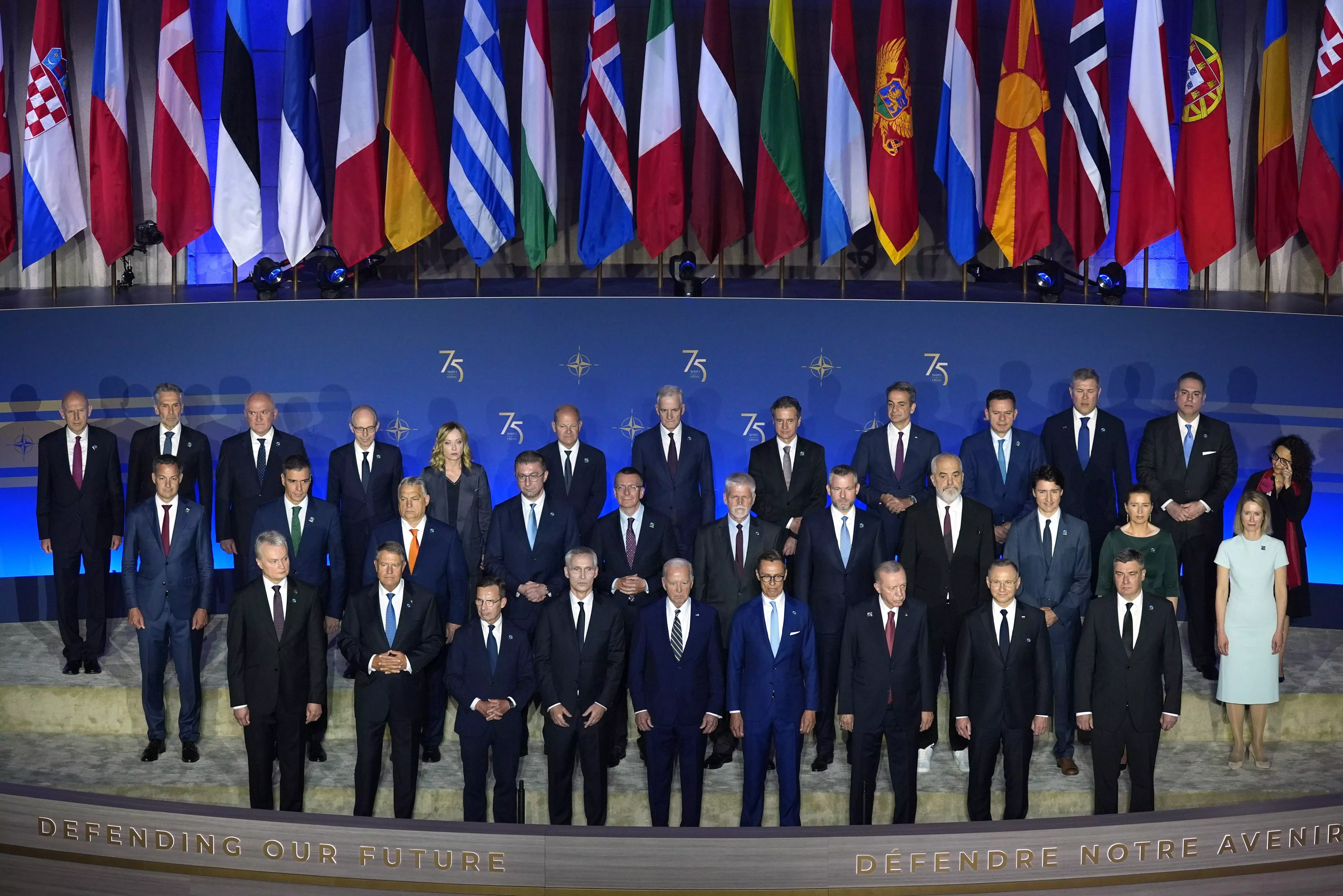
China a ‘decisive enabler’ of Russia’s war against Ukraine: NATO
Mutually-reinforcing attempts by Russia and China to undercut and reshape rules-based international order cause for profound concern: Summit declaration

In their most serious rebuke against Beijing, NATO allies on Wednesday (July 10) called China a “decisive enabler” of Russia’s war against Ukraine and expressed concerns over China’s nuclear arsenal and its capabilities in space.
The sternly-worded final communiqué, approved by the 32 NATO members at their summit in Washington, makes clear that China is becoming a focus of the military alliance. The European and North American members and their partners in the Indo-Pacific increasingly see shared security concerns coming from Russia and its Asian supporters, especially China.
Beijing has denied that it supports Russia’s war efforts and insists that it conducts normal trade with its northern neighbour.
China a war enabler: NATO
In the communiqué, NATO member countries said China has become a war enabler through its “no-limits partnership” with Russia and its large-scale support for Russia’s defence industrial base.
“This increases the threat Russia poses to its neighbours and to Euro-Atlantic security. We call on the PRC, as a permanent member of the United Nations Security Council with a particular responsibility to uphold the purposes and principles of the UN Charter, to cease all material and political support to Russia’s war effort,” read the communiqué, which referred to China by the abbreviation of its official name, the People’s Republic of China.
Cause for profound concern
The NATO expressed concerns over the deepening relationship between Russia and China, and the latter’s aggressive behaviour.
“The People’s Republic of China’s (PRC) stated ambitions and coercive policies continue to challenge our interests, security and values. The deepening strategic partnership between Russia and the PRC and their mutually-reinforcing attempts to undercut and reshape the rules-based international order are a cause for profound concern,” said the Washington Summit Declaration.
“We are confronted by hybrid, cyber, space and other threats and malicious activities from state and non-state actors,” said the declaration issued by the heads of state and government participating in the meeting of the North Atlantic Treaty Organisation (NATO) in Washington during which it welcomed Sweden as its 32nd member country.
“Threats are global and interconnected”
The historic accession of Finland and Sweden makes them safer and the alliance stronger, including in the High North and the Baltic Sea, it said.
Russia’s full-scale invasion of Ukraine has shattered peace and stability in the Euro-Atlantic area and gravely undermined global security, said the declaration, adding that Russia remains the most significant and direct threat to the allies’ security.
“Terrorism, in all its forms and manifestations, is the most direct asymmetric threat to the security of our citizens and to international peace and prosperity. The threats we face are global and interconnected,” it said.
China a force for world peace: Beijing
Beijing has expressed displeasure at NATO’s growing interest in Asia and demanded the alliance stay out of the Asia-Pacific region and not incite confrontation.
“NATO should not use China to justify its insertion into the Asia-Pacific and attempt to disrupt regional dynamics,” said Lin Jian, a spokesman for the Chinese foreign ministry, on Tuesday. “China is a force for world peace, a contributor to global development and a defender of international order.”
“Extraordinary step” by NATO
Danny Russel, a former assistant secretary of state for Asia and now vice-president for international security and diplomacy at the Asia Society Policy Institute, called the new wording by NATO “an extraordinary step”, particularly since it was coupled with the warning that Beijing continues to pose systemic challenges to European interests and security in the same communiqué.
“It is a mark of how badly Beijing’s attempt to straddle Russia and Western Europe has failed and how hollow its claim of neutrality rings,” Russel said. “China’s attempts at divide-and-conquer have instead produced remarkable solidarity between key nations of the Euro-Atlantic and the Asia-Pacific regions.”
NATO must not fall behind Russia: Biden
In Washington, where leaders of NATO nations are convening to mark the coalition’s 75th anniversary this week, US President Joe Biden said the alliance must not fall behind Russia, which is ramping up weapon production with the help of China, North Korea and Iran. Jens Stoltenberg, general secretary of NATO, said in his opening remarks that NATO would be enforcing its partnerships in the Indo-Pacific.
At the 75th anniversary summit, NATO took steps to strengthen its deterrence and defence, bolster long-term support to Ukraine so it can prevail in its fight for freedom, and deepen NATO’s partnerships. “We warmly welcome President (Volodymyr) Zelenskyy of Ukraine and the leaders of Australia, Japan, New Zealand, the Republic of Korea and the European Union,” said the declaration.
Australia, New Zealand, Japan and South Korea sent their leaders or deputies to the NATO summit in Washington this week. They are partners, not members, of the alliance.
NATO’s Indo-Pacific push
Earlier in the day, NATO Secretary General Jens Stoltenberg said the alliance will reinforce its partnerships in the Indo-Pacific to push against the growing alignment of Russia, China, Iran and North Korea.
“We will increase our support for Ukraine by establishing a NATO coordination and security assistance and training for Ukraine, and by ensuring a sustained support for the long term. Support to Ukraine is not charity. It is in our own security interest,” he said.
(With inputs from agencies)

